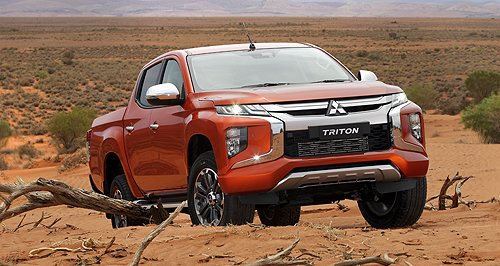News - MitsubishiPlug-in inevitable for pick-ups: MitsubishiLarge and in Charge: Mitsubishi will move to plug-in hybrid powertrains for its Triton one-tonne pick-up around 2025 in an effort to stay ahead of ever tightening emission regulations. Tightening emissions regulations to push Mitsubishi into electrified Triton pick-up12 Nov 2018 By TUNG NGUYEN in BANGKOK FUTURE Mitsubishi Tritons will be offered with plug-in hybrid powertrains, according to Mitsubishi Motors Corporation corporate vice-president of product strategy Vincent Cobee, and they are likely to materialise around 2025.
Speaking to journalists at the global launch of the updated Triton, Mr Cobee said tightening emissions regulations mean that plug-in hybrid technology will inevitably be introduced to its workhorse range.
“What is very interesting, if you look at the pick-up market in particular, is that you have the extremely hardcore, very professional use, low-regulation markets, which represents more than half of the volume – we’re talking here a regulation environment between Euro 2 and Euro 4, moving to Euro 5,” he said.
“And then at the other end of the spectrum, you have much more of a passenger-car orientated pick-up market of Western Europe, which is currently in Euro 6 and expected to move to Euro 7.
“We need to deal with low running costs, extremely durable, hardcore tools in low regulatory environments and we need to anticipate an extremely challenging emissions regulations environment in Europe.
“I think if you forward think into the European environment, 2025 will be a very tough milestone to pass, in other words, we can foresee in a number of countries that the passenger-car use of the pick-up will move into the passenger-car taxation system, and we can also foresee that Euro 7 is going to be a tough one.”
Mr Cobee said plug-in hybrid electric vehicle technology, which is also featured on Mitsubishi’s Outlander medium SUV and planned to be upgraded to around 100km of emissions-free driving range in future, is the only system that could work due to the Triton’s unique requirements.
“Today the pick-up market is mostly driven by performance, durability, cost of ownership, and toughness, and the answer today is a frame base, and diesel,” he said. “The PHEV tech today has not reached sufficient level of cost performance or durability demonstration to be an easy installation.
“The guess you’re making (plug-in hybrid Triton) may become a reality by about 2025, which means one way or another we are going to have to electrify those vehicles, because there will be a limit on what conventional combustion engines can provide, because the demand for power, torque, towing will remain.
“We can easily convince ourselves that there might be innovations to be done to bring a form of electrification that brings toughness, reliability and no range anxiety. I think it will migrate towards heavy and tougher vehicles.
“Just to be clear; towing, load, maintenance, PHEV can achieve it all, we just need to spend enough.”
The current fifth-generation Triton launched internationally in 2014 and has now received a mid-lifecycle update with a bold new look and increased safety technology.
With Mitsubishi now part of the Renault-Nissan-Mitsubishi Alliance, it is expected that the next-generation of pick-ups from each respective brand will share the same platform, which could emerge in about 2022.
As such, the plug-in hybrid Triton could possibly materialise as a lifecycle update to the next-generation Triton.  Read more |
Click to shareMitsubishi articlesResearch Mitsubishi Motor industry news |

















Facebook Twitter Instagram